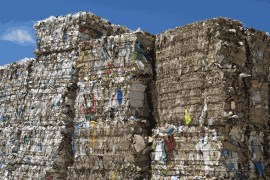
by Shane Henson — July 19, 2013—Building on its reputation for being a game changer and leader in the area of sustainability, the Carbon Trust announced this month that it will launch the world’s first international standard for organizations to certify that they are managing and reducing waste.
The announcement coincides with the fifth anniversary of the launch of the Carbon Trust’s Carbon Standard, which has helped hundreds of organizations take a more stringent approach to managing and reducing carbon, says the company, an independent not-for-profit company set up by the U.K. Government with support from business to take the lead on low-carbon technology.
This experience is now being applied to waste management, and, together with the recent launch of the Carbon Trust Water Standard, will help businesses and public sector organizations from across the world take a more robust approach to resource management. The Carbon Trust stresses the importance of managing resources by citing statistics that every year, landfill from commercial and industrial waste is responsible for 2.3 million tons of carbon dioxide equivalent (CO2e).
Compounding this problem, only 21 percent of senior executives of large companies in the U.K., United States, China, South Korea and Brazil have sustainability targets for waste, says the Carbon Trust. And just as problematic, 49 percent are not yet confident that there is a business case for investing in managing waste.
To assist businesses worldwide, the Carbon Trust Waste Standard will require organizations to measure, manage and reduce their solid and hazardous waste. To achieve the standard, organizations will need to demonstrate that waste streams are being reduced every year, or disposed of more effectively, for example through increased reuse, recycling or energy recovery.
The new Carbon Trust Waste Standard will also include a qualitative assessment to show that waste is being managed responsibly or prevented. The assessment will include considerations outside of an organization’s direct control, such as having a diligent procurement policy for goods and waste management services, or looking at downstream impacts through products and packaging.




